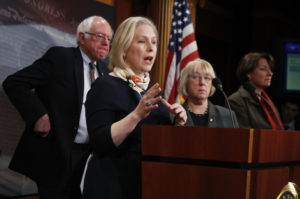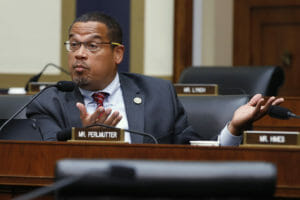Franken Calls for Oversight of Ratings Agencies
Sen. Al Franken, D-Minn., is disturbed by the monopolistic power of the ratings agencies -- and still determined to curb their abuses, as he tried to do last year with an amendment to the Dodd-Frank banking reform bill.With world markets suddenly sagging under the weight of Standard & Poor’s Aug. 5 downgrade of Treasury bonds, Sen. Al Franken, D-Minn., is disturbed by the monopolistic power of the ratings agencies — and still determined to curb their abuses, as he tried to do last year with an amendment to the Dodd-Frank banking reform bill.
In an exclusive Monday interview for The National Memo, the Minnesota Democrat said that the misconduct of the ratings agencies led directly to the economic catastrophe that S&P’s rating decision has made even worse. Franken wondered aloud why his proposed reforms of the ratings industry should still be subject to “study” rather than action by the Securities and Exchange Commission.
By setting up an independent federal board to assign ratings jobs to the agencies — rather than letting them be paid by those who issue the securities they grade — his proposal would have severed the industry’s gross conflicts of interest. Known as the “issuer pays” model, that traditional relationship let the banks reward S&P and Moody’s for awarding rubber-stamp AAA ratings to worthless mortgage-backed securities (as they did for years before the housing bubble burst).
It was those abuses, Franken said, that left taxpayers, workers and government “holding the bag” while the bankers and ratings firms walked away with huge profits. “What I was trying to do was open this business to more competition,” he said. “And then ultimately, as time went on, the track record of accuracy would be the thing that determined who got what (contract) and who got to grade (which securities). You’d be rewarded for accuracy instead of bribery. Put those alongside each other — bribery, accuracy. Accuracy, bribery, hmm.” He laughed. “Which method do you think will probably yield a better product, a more transparent product?”
He recalled, “The problem wasn’t just that (the ratings agencies) gave these AAA ratings to subprime mortgage securities. It’s that after the banks ran out of subprime mortgages to securitize, they then gave AAA ratings to bets on subprime. They created an entire other ‘market’ based on so-called derivatives that allowed the banks to bet on (or against) the future value of those assets.
“Basically, the banks were going like, ‘Oh, man, we’ve run out of these subprime mortgage-backed securities; we can’t make any more money with these things. Wait a minute. Why don’t we do derivatives of them? Great idea! You know what? We need AAA ratings, though. … No problem! We’ll just go to our pals, the guys we’ve been paying for these other AAA ratings, and ask them to rate these! Wink wink.” He laughed again. “And then they did those!”
The result, said Franken, was the construction of a “house of cards” that became “bets on bets.” To award AAA ratings to those securities was “unconscionable and unbelievable,” he added, “but it created the market that led to this collapse.”
In his view, the way to prevent similar abuses in the future is “to open this business to more competition,” with reforms overseen by a board composed mainly of institutional investors, as well as members from the ratings agencies and the investment banking community. Rating firms that are smaller than S&P and Moody’s would have a better chance to compete under such a system, he said, “because they would develop expertise” in certain areas of finance. Big and small firms alike “might be rewarded for their diligence, intelligence and ingenuity” rather than their prejudicial treatment of dubious investment vehicles. “They’d get more business if they’re more accurate and less business if they’re less accurate.” The old-fashioned American way of doing business? “Yeah, I think there was a time when that was rewarded,” he said sardonically.
Franken’s own reward, most recently, was a strange editorial in Monday’s Wall Street Journal, which accused him of protecting the oligopoly enjoyed by the three major ratings agencies. “You know how usually they bend the truth?” he said of the notoriously conservative Rupert Murdoch-owned daily’s editorial page. “Well, this is the opposite of the truth. I was the nemesis of the rating agencies. When my amendment passed, the rating agencies’ stocks went down the next day.”
Although the Franken amendment passed the Senate by a substantial margin, with many Republican votes, his proposed reforms were delayed by a two-year study of the problem now under way at the SEC. “I don’t know why you need to do much of a study on this thing,” he said. “We know what happened. This is like doing a study on whether using steroids is a good idea for ballplayers.” There was Republican opposition to his reforms, especially in the tea party-dominated House. But according to Franken, it was Sen. Chris Dodd, D-Conn. — then the chairman of the Senate Banking, Housing and Urban Affairs Committee — who told him that the ratings agencies needed to be studied further because “unintended consequences” might result if his reforms were implemented immediately.
“I said, ‘What in this bill couldn’t conceivably have unintended consequences?’ ” he said. “Everything could possibly have unintended consequences.” He laughed again. “We’d never pass anything if it had to be held up to that standard.”
And, of course, there could be unintended consequences from doing nothing, as well — as we are now learning. Franken said that he doesn’t know how much money the ratings agencies earned from past abuses.
“The banks made their money. The ratings agencies made their money. And all of us are left holding the bag, with this high rate of unemployment and the inability of small businesses to get capital, which makes unemployment worse. And they’re still making fortunes now.”
Joe Conason is the editor in chief of NationalMemo.com.
© 2011 Creators.com
Your support matters…Independent journalism is under threat and overshadowed by heavily funded mainstream media.
You can help level the playing field. Become a member.
Your tax-deductible contribution keeps us digging beneath the headlines to give you thought-provoking, investigative reporting and analysis that unearths what's really happening- without compromise.
Give today to support our courageous, independent journalists.






You need to be a supporter to comment.
There are currently no responses to this article.
Be the first to respond.